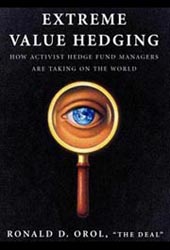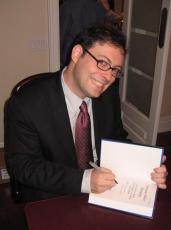International financier George Soros thinks the financial tension in the markets is going to ease out but there are still a number of landmines left to navigate around.
Case in Point: Credit Default Swaps, or CDOs, a synthetic financial instrument that acts as an insurance policy against debt defaults.
“This is a totally unregulated market hanging like a Damocles sword over the financial system,” Soros told reporters on a conference call hosted by the New America Foundation Friday. “You don’t know whether your counterparty is good for its payment or not.”
This is a concern that others in the financial markets have expressed. Jonathan Sablone, partner at Nixon Peabody LLP in Boston, discusses it in my “An open book?” news story in The Deal magazine.
Soros suggested that there is an active and unregulated $45 trillion CDS market that has become unhinged from actual hedging against defaults. Regulators and industry players need to create a clearinghouse or exchange where these swaps can be settled according to well established rules is critical to avoid an implosion, Soros adds. “Until that happens the market is nervous and creates this counterparty risk,” he said. “People who have these contracts need to know whether or not the counterparties are good or not and you will only know that when you know who the counterparties are.”
He contends that the amount invested in the CDS market is roughly equal to 1/2 the entire U.S. household wealth or five times the U.S. national debt.
The biggest player, Soros ponits out, is J.P. Morgan Chase Inc., which has roughly $16 trillion to $18 trillion in CDS’s while Bear Stearns Cos. has $2.5 trillion CDSs. But Soros notes that a large chunk of these financial instruments are held by individual hedge funds. Hedge funds holding CDS obligations both as parties and counterparties and observers are concerned that the inability of highly leveraged counterparties to meet their obligations on such instruments could lead to a "cascade" failure through the system.
Soros says he takes a middle of the road approach to market regulation. “I have found myself to be a critic of both market fundamentalism in the west and a critic of state regulation in the former Soviet Union,” Soros said. “We have to stop swinging from one extreme to the other.” -- Ron Orol
Friday, April 4, 2008
George Soros on Credit Default Swaps
Subscribe to:
Post Comments (Atom)


No comments:
Post a Comment